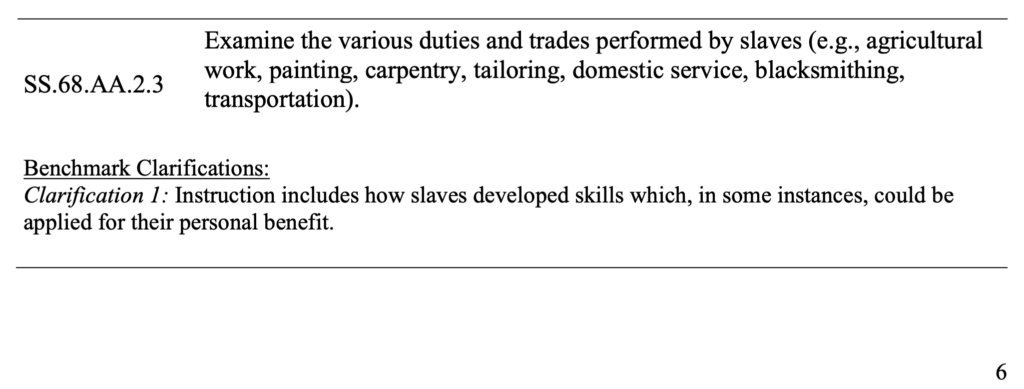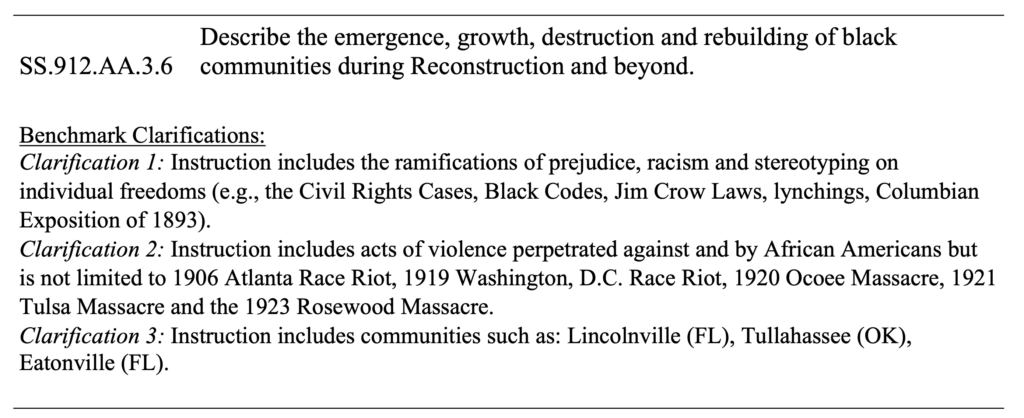Still Thinking about the Past
On Florida's updated standards regarding slavery.

In a couple of recent posts, I have noted what I think are general, and in some cases very specific, deficiencies in our collective memory/understanding of our past as it relates to slavery and post-enslavement in the United States. It would appear that the state of Florida wants to help bolster my arguments. Revised social studies standards were approved in the state this week and there are some specifics in those standards that help underscore my point that we tend not to want to grapple with our past in ways that really underscore the effects of slavery, segregation, white supremacist terrorism, Jim Crow, and the like.
Specifically, here is the standard that has drawn the most attention straight out of Florida’s State Academic Standards –Social Studies, 2023.

This strikes me rather straightforwardly as an attempt to soften the brutality of slavery. Let’s face facts, while it is not factually incorrect to state that “slaves developed skills which, in some instances, could be applied for personal benefit” this papers over that the “instances” in which those “skills” could be “applied for personal benefit” is freedom. In other words, these alleged benefits could only be accessed if a) the slave ran away and was able to retain their freedom, b) the enslaver freed the slave, or c) slavery was abolished. Those are some mighty specific (and wildly unlikely) “instances.”
This is a clear attempt to soften discussions of the brutality of chattel slavery. Just like attempts to assert that enslavers treated slaves well because they were valued property, this is an attempt to give white citizens, in particular, some rationalization fuel. It reminds me of things like being told that the descendants of the enslaved should be happy about the past, because they get to live in America.
Let’s be clear: there are a lot of whites who want, desperately, to have an excuse to pretend like the past really wasn’t as bad as we know that it was. After all, if it really wasn’t that bad, we can stop worry about the ongoing ramfications of the past.
Likewise, there is this.

Now, credit where credit is due, the standard mentions several events that I have noted need to be more widely taught. The problem is the second clarification that asserts the need to include “acts of violence perpetrated against and by African Americans” (emphasis mine) which comes across to me as both-sidesing the situation in a way that, again, attempts to soft pedal reality. As best as I can tell, there is no clarification about “acts of violence perpetrated against and by British colonists during the American Revolution” nor about “acts of violence perpetrated against and by Allied forces in Europe during WWII.”
In other words, if I am being too subtle, in violent clashes in which we already “know” who the good guys and bad guys are, no one feels the need to elaborate on the fact that the good guys also committed violence (or, to be more specific, the victims of violence also often respond in kind).
I will confess to not being an expert on the events listed above, but I am fairly certain they are all examples of white supremacist violence against Blacks. And yes, I expect any number of persons engaged in violence in those incidences, and that fact would likely be relevant to a lesson on these subjects. But the question is not whether the clarification is based in reality. The question is: why is this being specifically highlighted in the standards? What would be the motivation to, as I noted above, provide some way to make the past look not quite as bad for the whites in the narrative?
Let me underscore this point. Florida officials and other defenders of these standards have stated that the statements are factually accurate. I am not arguing that they are not. However, discussing their accuracy is a distraction. The issue is why these specific clarifications were chosen over hundreds of other clarifications that could have been entered. Why not “clarify” family separations? Why not point out that female slaves were often raped by their enslavers and that children that resulted were also enslaved? Why not clarify any number of hideous realities of chattel slavery instead of actively choosing to point to something that kind of sounds positive/builds in some excuses for the abuses?
I would also underscore that there was limited space in these standards for clarifications and therefore it is more than fair to scrutinize why specific choices were made (because it should not be forgotten that very specific choices are, in fact, being made).






Gee, it’s like all these people can’t handle the idea that America hasn’t always lived up to its own ideals. I would call them…snowflakes.
“slaves developed skills which, in some instances, could be applied for personal benefit”
… but which, far more often, were applied to the benefit of slaveholders.
Slaves were indeed rented out if they had certain skills – blacksmith, carpenter, cooper – and in some cases the slave was allowed to pocket some portion of the earnings. They were then, in some limited cases, allowed to use the money to buy themselves, their spouse or children.
And that is what a morally depraved person would describe as a saving grace. The ability to buy your own body. The ability to buy your children which were a White man’s property.
Republicans are sick in the head.
How does this square with the motion of preserving history, as they whine every time a monument to a confederate traitor is removed?
But they ARE not factually accurate. They point to incidents of Black on white violence (e.g., the Ocoee massacre, the Tulsa race riots) without any context as to how the white people in charge started the violence and the Black people involved fought back (stood their ground, one might say). In the case of Ocoee, the Black men were still lynched. In the case of Tulsa, the white people burned down the entire Black community. They are cherry picking parts of facts to push and suit a narrative.
Sometimes they got to be a house slave rather than a field slave!
Falsification by misdirection.
The intent is plain, and entirely mendacious.
@Michael Reynolds:
Let them have their saving grace, I say. By all means, let them make heroes out of the few white slave owners who treated their slaves well, gave them training in trades and then released them. They were the ones who viewed black people as fully human. This is the key message which must be o-so-very very carefully introduced to those who need it most. I hope they insist on statues in parks of these few “true” Southerners. Let them be their new guiding lights.
This is just the standard pablum about American racism being somehow more complex than the good/bad binary the angry left shoves down everyone’s throat. It has nothing to do with complexity or nuance. Show these people WEB DuBois, black power or anything MLK did or said outside of one speech, especially in the late 60s, and they melt down. They want Booker T. Washington preaching compromise on white people’s terms retrospectively, 24/7, or else.
I do remember that DeSantis used to teach at a private school in Georgia in the early 00s and apparently was universally mocked both for being a creep and way into the Lost Cause. I wonder how much is this comes down to apologies for racism being untenable even for rich white kids in Georgia, and how black power is accessible to everybody. Somebody like Andy talking about binaries in history endlessly is accessible only to people who are 100% like Andy. Any kid can understand what the Panthers were up to, good and bad, in Chicago. You can be white and rich and you will get the Panthers. That’s the fear. And that’s why they made a Hollywood movie about Fred Hampton.
I just looked through the document. My quick impression is that it’s designed to be dumb and aspirational and past 1950 it’s only civil rights and not economic discrimination during the New Deal and after civil rights, it’s just achievement.
The narrative, as they say, is trash. Basically, the anti-1619 project. No mention of busing, slave revolts, redlining, white flight. In the hands of somebody good and intelligent, it could easily be subverted, but it’s designed to appease white people and their lackeys stuck in 1985.
The biggest tell is that they mention the arts and what black people have contributed, but there’s no mention of hip-hop, which will strike every living young soul as insane. Hip-hop has hit the level of global muzak but it’s way too black for people angry at the 1619 project.
@dazedandconfused:
Ooooh, I like that idea. That is some excellent propaganda right there. Embrace the anti-Confederacy Southerners. Smart. Devious. And leaves them with no pushback.
@Modulo Myself:
I’ll tell you what someone should do. Virtually any kidlit book that comes out will have a teacher’s guide, sometimes produced by the publisher, sometimes amateurs. Someone should write a liberal teacher’s guide to teaching within the lines while subverting the confederate narrative.
Next up: “you black people should be happy that we brought your ancestors over here to America!”
I thought we’d passed peak Orwell.
“Who controls the past controls the future. Who controls the present controls the past.”
@Michael Reynolds:
I honestly don’t believe you can teach the RW version any more than one can write a book about it, which is why there are no more books about this ideology, just culture battles. This isn’t even the Lost Cause version of history. It’s the equivalent of teaching about Martin Luther King but ignoring everything he ever said, wrote, or did, except for a couple of lines about not seeing race. It’s like living in a house with a 1000 doors but screaming that 999 are off-limits and don’t be–don’t ever be—suspicious.
I acknowledge this analogy is rather crude but saying that slavery might have had some obtuse benefit is like telling a red neck that a “black man shtoping your wife is beneficial since she will experience orgasms not felt before”
Bravo Steven. Another great post on the topic.
What I’ve found telling, though not surprising, is the number of “anti-woke, professional-moderate” pundits who have twisted themselves into knots to claim that “this law really isn’t that bad.” It’s telling when writers are concerned with “really understanding the nuance” of something and cases where they are not. And all to often those pundits focus on minimizing discussions of race… for some reason.
The Tampa Bay Timese had some great analytical reporting into the states flawed examples of people who benefits from skills supposedly learned during slavery:
https://www.tampabay.com/news/education/2023/07/21/benefited-slavery-critics-say-some-states-examples-were-never-even-slaves/
The Tampa Bay Timese had some great analytical reporting into the states flawed examples of people who benefits from skills supposedly learned during slavery:
https://www.tampabay.com/news/education/2023/07/21/benefited-slavery-critics-say-some-states-examples-were-never-even-slaves/